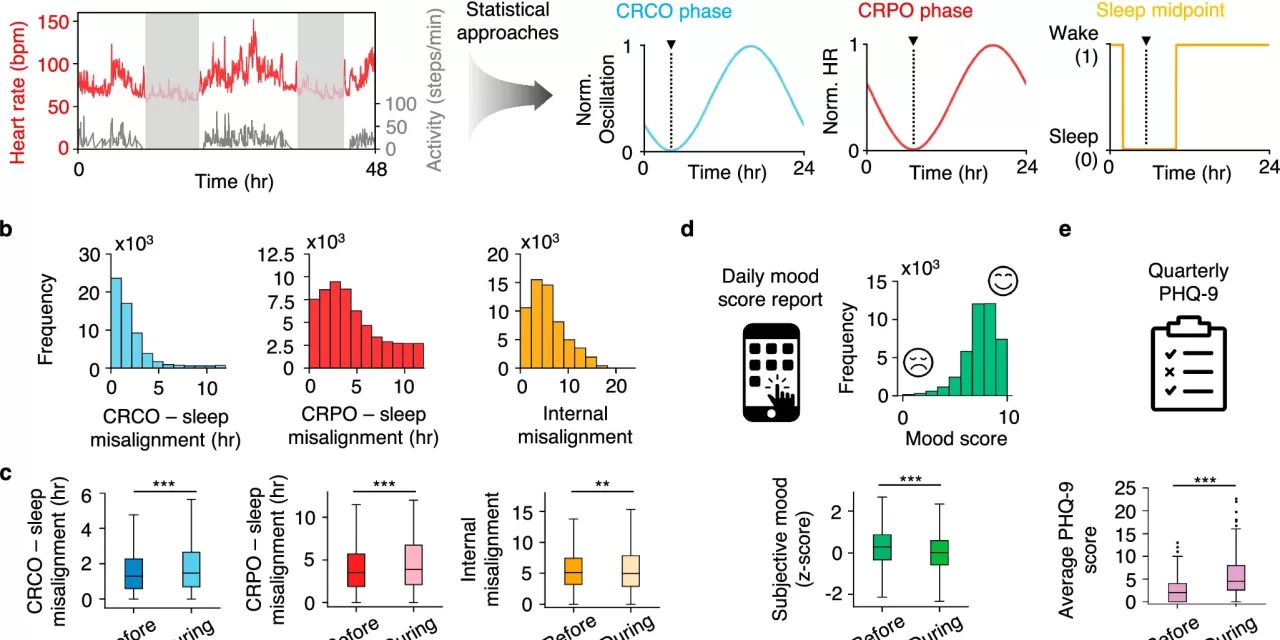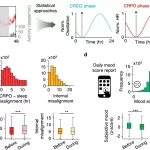University of Michigan researchers uncover how aligning sleep with circadian rhythms can boost mood and mental health.
As the end of the year draws near, sleep often becomes the first casualty of mounting to-do lists. However, a new study from the University of Michigan suggests that those seeking happy holidays should prioritize syncing their sleep schedules with their internal clocks.
The research, published in npj Digital Medicine, reveals that misalignment between sleep cycles and circadian rhythms—a system regulating the body’s internal clock—can significantly impact mood. Conversely, sleeping in harmony with these rhythms can improve emotional well-being and mitigate symptoms of mood disorders, said senior author Daniel Forger, a professor in the Department of Mathematics and director of the Michigan Center for Applied and Interdisciplinary Mathematics.
“This won’t cure depression, but it’s a key factor we can control,” Forger explained. “While we can’t change life events, relationships, or genetics, we can closely monitor and adjust individual sleep patterns to positively impact mood.”
The Science Behind Sleep and Mood
The study builds on long-standing evidence that sleep quality, duration, and timing affect mental health. Unlike previous research conducted in controlled laboratory settings, this study analyzed real-world data using wearables like Fitbits, offering a practical lens on the issue.
The research leveraged data from the Intern Health Study, which tracks first-year medical residents, a group prone to irregular sleep schedules and high stress. Interns completed daily mood surveys, quarterly depression screenings, and wore fitness trackers that measured their sleep and heart rhythms.
Using algorithms developed by Forger’s team, researchers assessed the synchronization between participants’ circadian rhythms, sleep patterns, and mood. They discovered that when sleep schedules were misaligned with internal rhythms, depression symptoms increased significantly. For instance, a measure called the PHQ-9—a widely used depression screening tool—showed an average increase of 2.5 points for individuals with desynchronized rhythms, a clinically relevant change.
The Importance of Alignment
Lead researcher Minki Lee, a Goldwater Scholar and undergraduate, emphasized that it’s not as simple as going to bed earlier. “It’s about aligning your sleep schedule with your internal rhythms,” she said.
The study examined three key patterns:
- The central circadian clock, regulated in the brain.
- The peripheral clock, which synchronizes bodily functions like heart activity.
- Sleep cycles, or the actual times participants went to bed and woke up.
Results showed that when sleep cycles clashed with peripheral or central clocks, mood suffered. Notably, mismatches between sleep and the central circadian clock—often caused by shift work—had the most pronounced negative effects, leading to symptoms like poor sleep, appetite issues, and even suicidal thoughts.
“This challenges the idea that all circadian disruptions have the same impact,” said co-lead author Dae Wook Kim, now an assistant professor at Korea Advanced Institute of Science and Technology.
Real-World Implications
The findings underscore the importance of tailoring sleep recommendations to individuals’ lifestyles and working conditions. For example, students pulling all-nighters or travelers experiencing jet lag may adapt without severe mood effects, but other contexts, like shift work, may pose greater risks.
The use of wearable technology, like Fitbits, makes these insights actionable and scalable. “This approach could help tons of people,” Forger said. The team is now expanding its research to other populations, including students, older adults, and individuals with psychiatric disorders.
As the year winds down, these insights provide a timely reminder: listening to your body’s natural rhythms may be one of the simplest ways to find joy—and better mental health—this holiday season.
More Information:
Minki P. Lee et al, “The real-world association between digital markers of circadian disruption and mental health risks,” npj Digital Medicine (2024). DOI: 10.1038/s41746-024-01348-6.











